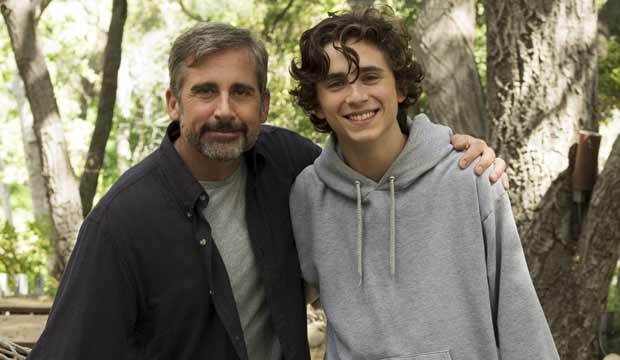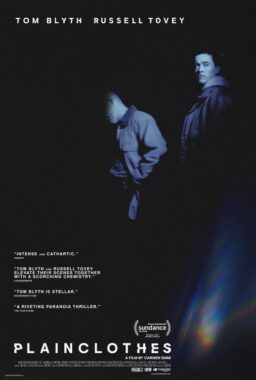“Beautiful Boy,” starring Timothée Chalamet as drug-addicted teenager Nic Sheff and Steve Carell as his journalist father David, is a harrowing movie, especially for parents. In contrast to a lot of stories about characters falling into addiction, Nic is already using when the story begins, and we experience his attempts to manipulate his father and hide his condition in terms of suspense rather than surprise: we know that eventually David, his wife Karen (Maura Tierney) and his ex-wife (and Nic’s mother) Vicki (Amy Ryan) will discover the extent of his problems, and after that, the only question will be what they can do to stop it. The answer, of course, is “nothing,” as anyone who’s been through this horror knows. Users don’t stop using because other people ask them to stop. They stop because they’ve figured out that if they don’t get clean, they’ll be miserable for the rest of their lives and probably die early.
The family here is upper-middle class to wealthy. Aside from some crackling scenes in the latter part where Nic gets in trouble with fellow addict Lauren (Kaitlyn Dever) — the two of them behaving as if they’re glamorous, doomed lovers in a lavishly produced Hollywood road movie, when they’re actually the sorts of people who break into houses to feed their habit and run away when the owners show up — “Beautiful Boy” doesn’t do enough to address the even harsher experience of being addicted when you don’t have parents with money for private rehab facilities, one of whom has the kind of job that allows him to take off for days at a time to deal with his son’s problems. (One way you can tell this is an early-aughts period piece, besides the computers and flip phones, is the fact that David’s journalism job allows him to own two homes and go long periods without writing.)
But the down-to-earth details of Nic’s misery, and his family’s anguish, are delicately observed and don’t pander to viewers who want an inspirational, tidy story. A narrative decision that would feel like a flaw in other movies feels like proof of integrity here: at roughly the 90-minute mark, Nic seems as if he’s about to get clean, only to relapse and end up back where he started, but even worse off.
Co-written by Luke Davies and Felix Van Groeningen, and directed by Van Groenigen, the movie lacks organization and focus, seemingly by design; it’s based on two books, the elder Sheff’s same-named memoir and “Tweak: Growing Up on Methamphetamines” by Nic Sheff. It leans hard on big-money music cues and has overdone bits. Overall, it feels a bit structurally scattered, even for a film that’s trying to push against the usual “addict-bottoms-out-and-gets-clean” template — the music is used as emotional spackle, providing the illusion of cohesion and forward motion — and I suspect that’s because the screenplay is trying to fuse two memoirs, by the father and the son. Maybe they should’ve picked one and stuck with it. But then we would have been denied indelible scenes of Nic wrestling with his demons, or David doing everything he can to save his boy but only enabling him, or the father and the son regarding each other across a series of tables, each trying to figure out how to get the other to do what he wants.
It probably sounds strange, but the film “Beautiful Boy” most reminded me of is “The Exorcist,” another horror movie about parents (and authority figures) stymied as to how to save a teenager possessed by evil forces. When young Nic says laceratingly cruel things to his father as punishment for not giving him money or forgiveness, or for disbelieving his lies, it’s as if a demon had read a mortal’s weaknesses and figured out how best to wound his soul. The long scene in the coffee shop between the father and the son that ends with the son storming out is so perfect and powerful that I wouldn’t have minded if it had been the entire movie: “My Dinner with Andre on Drugs.”
Carell will probably never escape the shadow of Michael Scott, just as Gandolfini could never escape Tony Soprano and Janet Leigh could never escape Marion Crane. But as problems go, that’s a good one to have, and he’s an honest, transparent, sincere actor. The movie made me think about the first time I met Carell, when he was being introduced to TV critics as the star of the American version of “The Office” 13 years ago. The melancholy that humanizes Michael is foregrounded when you’re in his presence; there is a profound sadness to his niceness, and this movie, maybe more than any of the sad films he’s made, gives you a sense of what it’s like to be in the room with that distinctive energy.
It goes without saying that Chalamet and Ryan are great in it, though I wanted more of Ryan’s character — she’s not even introduced until an hour in, and she’s not especially well-used. Tierney is great in a slightly more substantive role, and her big solo near the end — behind the wheel of a car — is some of her best work.
I appreciated seeing “Beautiful Boy” with a modest sized audience at a local theater. Two-hour dramas about families muddling through a son’s drug addiction are not exactly laugh riots. You have to really want to see a film like this to go out on a dark, cold night. But everybody was rapt. Afterward, people were crying and hugging each other in the lobby. I rarely see that kind of thing anymore.












